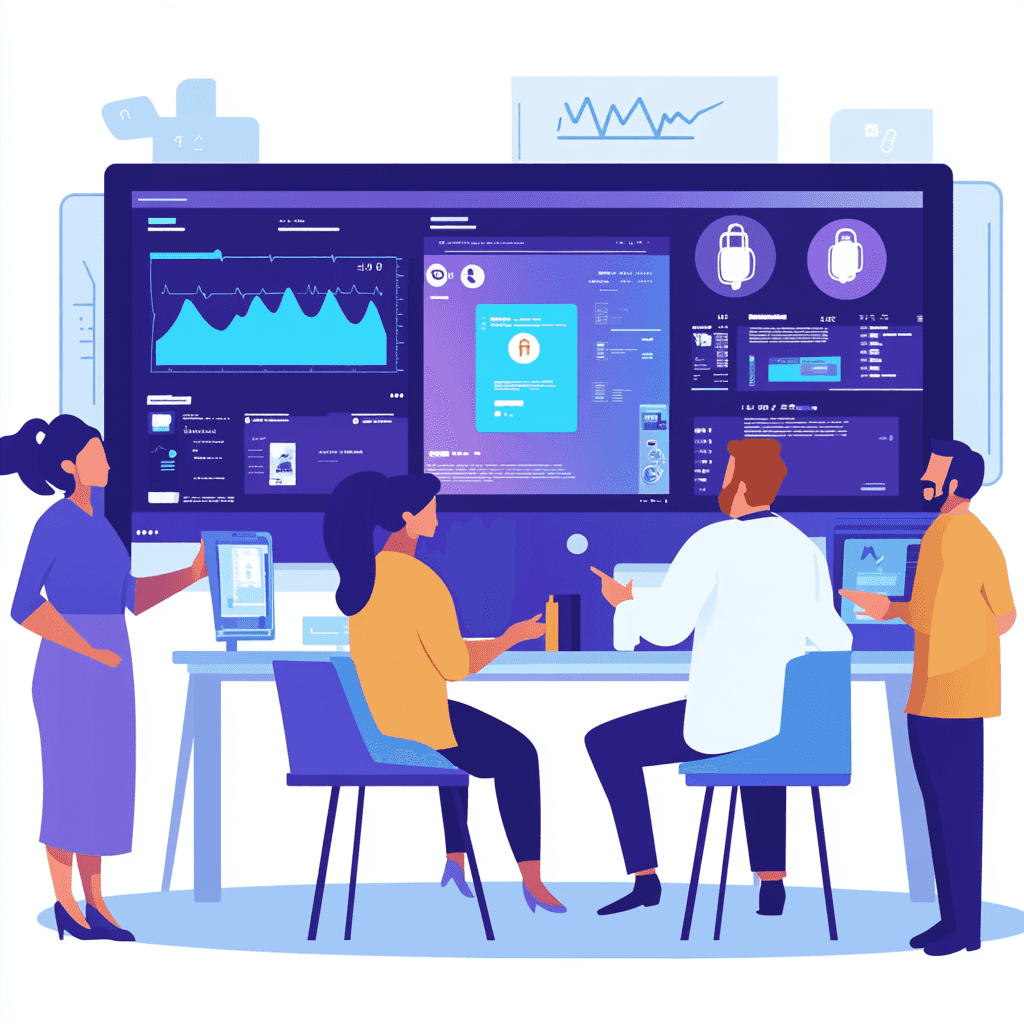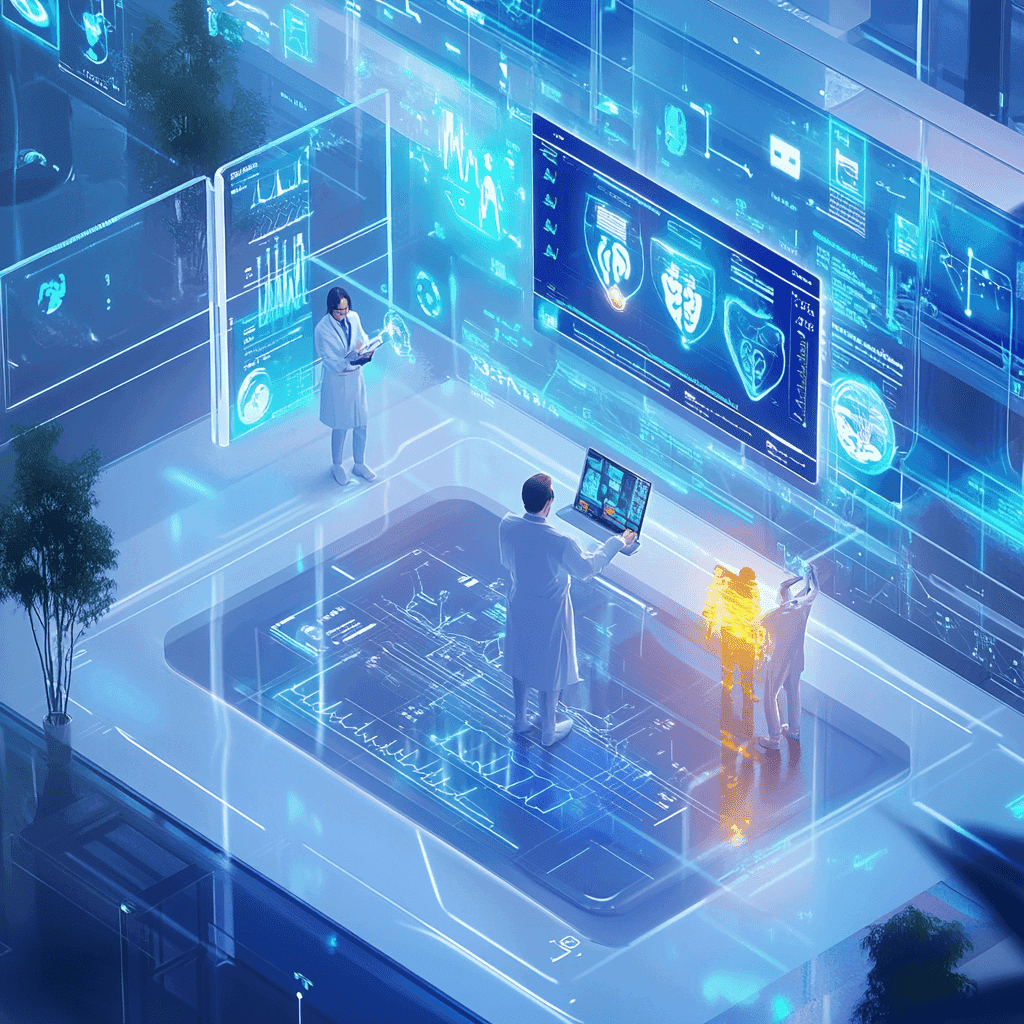In today’s rapidly evolving digital landscape, the healthcare industry is increasingly leveraging technology to enhance patient care, streamline operations, and improve overall health outcomes. A pivotal aspect of this transformation is the development of healthcare applications that cater to various needs, from telemedicine and remote patient monitoring to fitness tracking and mental health support. Selecting the right healthcare app development company is crucial for healthcare providers aiming to implement effective digital solutions. This comprehensive guide delves into the essential considerations for choosing an ideal development partner, supported by relevant statistics, informative tables, and a decision-making diagram to facilitate your selection process
The Expanding Healthcare App Market
The global mobile health (mHealth) apps market has witnessed significant growth in recent years, reflecting the increasing demand for digital health solutions. In 2023, the health app industry generated $3.43 billion in revenue, marking a 9.9% increase from the previous year. Notably, there were 311 million health app users, with apps being downloaded a total of 379 million times that year.
Table 1: Global mHealth Apps Market Growth
Key Considerations in Selecting a Healthcare App Development Company

Selecting a healthcare app development company is a significant decision that requires careful evaluation of multiple factors. Healthcare applications must meet strict regulatory standards, provide a seamless user experience, and incorporate advanced technologies to remain competitive. Below are seven key aspects to consider when choosing the right development partner.
Experience and Expertise in Healthcare App Development
A company’s experience in developing healthcare applications is the first indicator of its capability to handle complex projects. Unlike generic app development, healthcare software requires specialized knowledge in compliance, security, and integrations with medical systems.
What to Look for in Experience?
– Industry-Specific Expertise:Choose a company that has worked on various types of healthcare applications, including telehealth platforms, EHR/EMR integrations, remote patient monitoring systems, and wellness applications.
– Understanding of Healthcare Workflows: A firm should demonstrate familiarity with clinical operations, hospital management, and patient engagement models to design an app that aligns with real-world healthcare needs.
– Portfolio and Case Studies: Reviewing past projects provides insights into the company’s ability to build scalable, user-friendly, and compliant healthcare solutions.
Example: A reputable firm might showcase projects like a HIPAA-compliant telemedicine app that increased doctor-patient engagement by 35% or an AI-powered symptom checker that reduced hospital visits by 20%.
Technological Proficiency and Innovation
To build a robust and scalable healthcare application, the development company must be well-versed in cutting-edge technologies.
Key Technologies to Look For:
– Artificial Intelligence & Machine Learning (AI/ML): AI-driven diagnostics, chatbots for symptom analysis, and predictive analytics for patient health trends.
– Blockchain: Securing electronic health records (EHR) and ensuring data integrity through decentralized technology.
– Cloud-Based Solutions: Cloud hosting (AWS, Azure, Google Cloud) ensures scalability, security, and compliance with healthcare regulations.
– Internet of Things (IoT): Wearable devices that track real-time health metrics (heart rate, glucose levels, oxygen saturation).
– Big Data & Analytics: Aggregating and analyzing patient data to improve healthcare decision-making.
Example: A company that has implemented AI-powered diagnostics to reduce patient wait times by 40% or integrated IoT wearables to enable real-time remote monitoring for cardiac patients demonstrates technological innovation.
| Technology | Application |
|---|
| Artificial Intelligence (AI) | Enables predictive analytics, diagnostics, and personalized patient monitoring. |
|---|
| Machine Learning (ML) | Facilitates data-driven decision-making and predictive modeling for patient outcomes. |
|---|
| Internet of Things (IoT) | Connects medical devices for real-time health monitoring and data collection. |
|---|
| Blockchain | Ensures secure and transparent handling of medical records and transactions. |
|---|
| Cloud Computing | Provides scalable data storage solutions and facilitates seamless data sharing. |
|---|
| Telemedicine Platforms | Supports remote consultations and virtual healthcare services. |
|---|
| Mobile Development Frameworks | Tools like React Native and Flutter enable cross-platform app development. |
|---|
| Data Analytics Tools | Platforms like TensorFlow assist in processing and analyzing complex healthcare data. |
|---|
| Wearable Integration Technologies | Utilizes Bluetooth and APIs like Google Fit and Apple HealthKit for real-time health tracking. |
|---|
Compliance with Healthcare Regulations and Data Security
Security and regulatory compliance are non-negotiable in healthcare app development. Any company you choose must follow industry standards to ensure legal and ethical patient data handling.
Regulations to Check For:
– HIPAA (Health Insurance Portability and Accountability Act): U.S. law ensuring that patient data is encrypted, stored securely, and accessed only by authorized personnel.
– GDPR (General Data Protection Regulation): European law governing the privacy and security of patient information.
– HITECH Act: Strengthens HIPAA compliance for electronic health records (EHR) security.
– FDA Approval (if applicable): Required for applications that offer medical-grade diagnostics or treatment recommendations.
Security Measures to Expect:
– End-to-End Encryption: Protects patient data from breaches.
– Multi-Factor Authentication (MFA): Enhances security for providers accessing sensitive information.
– Role-Based Access Control (RBAC): Ensures that only authorized personnel can access specific data.
Case Study: In 2023, a U.S.-based hospital faced a $1.5 million fine for failing to comply with HIPAA data security standards. Selecting a fully compliant development firm prevents such costly violations.
User-Centric Design and Accessibility
A successful healthcare application prioritizes an intuitive and user-friendly experience for both patients and healthcare providers.
What Makes a Great UX/UI?
– Easy Navigation: A clear layout that allows patients to schedule appointments, view test results, and access medical records without frustration.
– Minimalistic Design: Avoids clutter while highlighting key functionalities.
– Accessibility Features: Text-to-speech, high-contrast modes, and voice commands to ensure usability for elderly patients or those with disabilities.
– Personalization: AI-driven insights that recommend appointments, send medication reminders, and offer personalized health tips.
Example: A mental health app with an intuitive interface increased daily user engagement by 60% by offering a seamless, distraction-free experience.
Table 2: Essential Features in Successful Healthcare Applications
| Feature | Description |
|---|
| User-Centered Design | Ensures the app is intuitive and meets the needs of its users. |
|---|
| Data Security and Privacy | Implements encryption and compliance with regulations like HIPAA to protect patient data. |
|---|
| Interoperability | Allows seamless integration with other healthcare systems and devices. |
|---|
| Scalability | Ensures the app can handle growth in users and data without performance issues. |
|---|
| Personalization | Offers tailored experiences based on individual user data and preferences. |
|---|
Seamless Integration with Existing Healthcare Systems

Most healthcare organizations already use multiple software solutions, and any new application should integrate smoothly with existing systems.
Key Integrations to Consider:
– Electronic Health Records (EHR): Enables real-time updates and access to patient data.
– Telemedicine Platforms: Ensures smooth virtual consultations between doctors and patients.
– Billing & Insurance APIs: Automates claims processing and billing calculations.
– Wearable Device Synchronization: Fetches real-time data from Fitbit, Apple Health, or glucose monitors.
Case Study: A healthcare startup integrated their app with existing hospital software and reduced manual paperwork by 80%, saving doctors an average of 5 hours per week.
Post-Development Support and Continuous Maintenance
Launching a healthcare application is just the first step. Ongoing maintenance and updates are essential to keep the app functional, secure, and aligned with industry standards.
What to Expect from a Reliable Development Company?
– 24/7 Technical Support: Addressing critical issues immediately to prevent downtime.
– Bug Fixes & Performance Optimization: Regular updates to enhance speed, security, and user experience.
– Scalability Planning: Adapting the application to handle more users as demand increases.
Example: A hospital telehealth app failed to update, resulting in 1,000+ missed virtual consultations in one month. A dedicated support team prevents such costly disruptions.
Conclusion: Making the Right Choice

Choosing the right healthcare app development company is a crucial step toward enhancing patient care, improving operational efficiency, and ensuring compliance with industry regulations. As the mHealth market continues to expand, organizations must partner with a trusted and experienced development firm that understands the complexities of healthcare technology.
At WTT Solutions, we specialize in building cutting-edge healthcare applications tailored to meet the unique needs of healthcare providers, startups, and enterprises. Our team has extensive experience in developing HIPAA-compliant telemedicine platforms, AI-powered diagnostics, patient engagement apps, and cloud-based healthcare solutions.
We focus on:
– Custom Healthcare App Development
– Seamless EHR and Telemedicine Integrations
– AI and IoT-Powered Health Solutions
– Secure and Scalable Cloud-Based Platforms
Ready to transform your healthcare business with innovative technology? Learn more about our expertise and explore our healthcare solutions




















